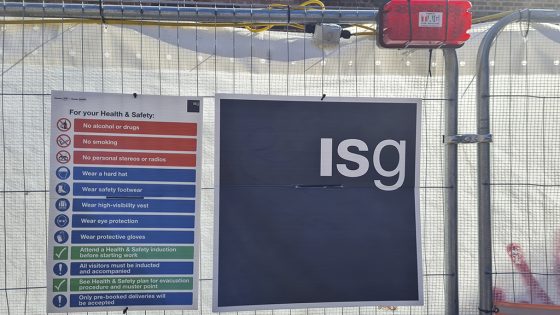The collapse of ISG dominated September’s headlines but the latest monthly administrations data from Creditsafe still gives cause for optimism about the construction sector.
There were 24 administrations in September, down year-on-year from the 28 recorded in same month in 2023.
The three-month total fell for the fifth quarter in succession. The tally of 61 firms from July to September was also the lowest quarterly total since Q2 2022 (48).
The Creditsafe data also showed that 25 per cent fewer firms collapsed in the first nine months of 2024 compared with January-September last year.
While these figures indicate a healthier business environment, the fall of ISG was a reminder of the difficulties facing contractors and their supply chain.
Administrators from Ernst & Young were appointed for eight ISG companies on 20 September. ISG’s UK operations have ceased and around 2,200 employees have lost their jobs.
The accounts for parent company ISG Ltd – ranked sixth in the CN100 2024 index of top contractors – are overdue but it had not officially entered administration at the time of writing.
The most recent accounts for the eight collapsed ISG firms covered the 2022 calendar year. They showed a combined turnover of £1.9bn and pre-tax profit of £56.5m.
At the time of their collapse, the companies were working on public sector projects worth at least £1.84bn and owed their supply chain more than £700m.
Law firm Wedlake Bell, the Construction Leadership Council and Build UK released a guidance document for ISG’s supply chain in early October. They stated that suppliers owed money by ISG were “very unlikely” to be paid “in the likely event of a subsequent liquidation”.
Two other companies connected with ISG’s US parent firm Cathexis called in administrators from Ernst & Young. Modular firms Extraspace Solutions (UK) and its wholly owned subsidiary Spatial Initiative were owned by Cathexis subsidiary ESS.
Extraspace Solutions (UK) posted a pre-tax loss of £15.4m from revenue of £31.5m in its most recent full-year accounts to 30 June 2022. The firm employed a monthly average of 64 staff, the accounts showed.
Spatial Initiative’s latest accounts for the 2022 calendar year revealed a pre-tax loss of £20.3m from turnover of £25.3m. Its average monthly headcount was 52.
Five other firms in the September list were large enough to have to file revenue and turnover figures with Companies House.
Civils contractor Glenevin Ltd and its subsidiary GCL Hire Ltd called in administrators from RSM to handle both firms’ affairs. The administrators blamed a “material deterioration in market conditions” for Glenevin’s demise.
The firm turned over £38.2m in its most recent published accounts for the year to 31 August 2022, generating £2.4m in pre-tax profit. It specialised in broadband network installations.
In a statement of proposals, the administrators said: “The company has historically been profitable, but more recently has been loss-making due to a number of poor contracts.”
The statement of proposals added that Glenevin suffered a £700,000 loss in its 2022/23 financial year. It added: “In the nine-month trading period to 31 May 2024, the company incurred further losses of about £3.4m.”
Derby-based JG Chatham Ltd called in administrators from PwC in mid-September. A sister company of modular housebuilder TopHat, last year it completed the Kitchener Barracks residential development in Kent.
The firm posted a pre-tax loss of £3.4m from turnover of just £507,500 in its most recent accounts for the year to 30 October 2022.
Outlook
The demise of ISG was likely to have “serious knock-on effects” in the supply chain, said David Crosthwaite, chief economist at the Building Cost Information Service.
“This is the largest business failure since Carillion… Further impacts will be felt throughout the supply chain as subcontractors and suppliers are left unpaid.
“So I suspect that insolvency numbers will rise as a result of the ISG failure.”
But other analysts remained broadly positive.
David Hayhow, head of insurer Lockton’s global construction practice, described “a lot of positive sentiment in the market, and it feels like the construction industry is set fair for a few years of growth”.
However, he told Construction News that any high-profile insolvency “is going to raise nervousness with surety providers”.
Hayhow added: “If you’re a surety underwriter, going to your boss to deploy capacity to a contractor will cause questions to be asked. There’s going to be more caution around why an insurer would deploy capacity to construction in general.”
Andrew Pepper, partner at business recovery firm ReSolve, said: “The vector of travel for the construction industry is positive.”
He added that contractors were expecting commitments to increase for infrastructure investment and housebuilding in the 30 October Autumn Budget.
“In addition, interest rates are set to lower and raw material prices are not as extreme, which will provide some stability in the market,” he told CN.
“However, businesses must survive until these factors start to materialise and be reflected in cashflows. Thinly capitalised construction businesses must absorb the downside and bridge the gap to the better times ahead; even if you have a healthy order book, it is cash today that is key to survival.
“My prediction is that the good times will start in the next 6-12 months; it’s for construction bosses to batten the hatches, take good independent advice and make it through until then.”

